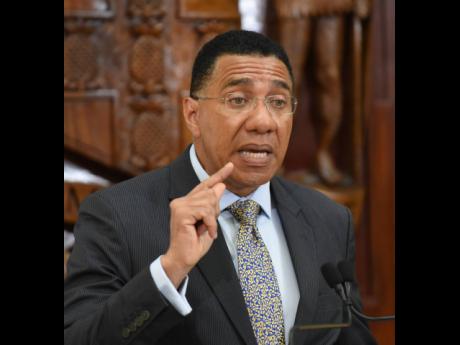Security mission not a panacea for Haitian gang violence, Holness warns
First batch of 24 J’can security personnel to arrive on Thursday
Prime Minister Andrew Holness says the United Nations-backed multinational security support mission to Haiti is not expected to resolve all the problems affecting the CARICOM country that has been plagued by gangs that control about 80 per cent of the capital, Port-au-Prince.
Asked if he was disappointed with the efforts of the security mission deployed since in June, Holness said that several moving parts have to be properly aligned for the work of the multinational team to be successful.
Speaking at a post-Cabinet press briefing at Jamaica House on Tuesday to announce the deployment of 24 members of Jamaica’s security forces to Haiti, Holness cautioned that it would not be wise to prepare the region to believe that the multinational security mission would be the only or final solution to the problem.
“There are important and significant diplomatic efforts being made and stakeholder efforts being made,” he said.
The prime minister said it is in Jamaica’s best interest to support a long-lasting resolution to the problems bedevilling Haiti, which is one of Jamaica’s closest neighbours.
Chief of Defence Staff of the Jamaica Defence Force, Vice Admiral Antonette Wemyss Gorman, said that the 24 personnel, comprising 20 soldiers and four cops, would be providing command, planning, and logistics support. They are expected to arrive in Haiti on Thursday.
Quizzed on why the number being deployed was significantly less than the 200 – 170 soldiers and 30 police officers – first pledged by Jamaica, the prime minister said this was a “build-up to our commitment”.
He noted that it was not possible to deploy them all at once.
DEPLOYMENT ISSUES
“It’s not practical,” he said, adding that facilities to host those arriving and a command structure need to be in place before the full number pledged is deployed. “We want a very successful operation.”
When United States Secretary of State Antony Blinken visited Haiti last Thursday, he said that more security personnel were needed to carry out the objectives of the mission. He warned that the Kenyan forces alone may not be able to quell the gang violence, noting that the mission was lacked money and personnel.
On Monday, United Nations Secretary General António Guterres said “it’s very strange” that there is apparently no money available to support the Kenyan-led mission.
“I think countries should assume responsibilities and should come and provide the necessary funding,” he said.
The mission is projected to cost around $600 million annually. However, the United Nations says it has only received US$68 million of the US$85 million pledged so far, with the majority of funds coming from the United States and Canada.
The Kenyan government has sent nearly 400 security personnel to Haiti to support the law enforcement efforts in the country. The East African country is expected to dispatch another 600 troops.
The mission is expected to comprise 2,500 personnel in total. The Bahamas, Bangladesh, Barbados, Benin, and Chad have also committed to sending police and soldiers, but the timing of their contributions is still uncertain.
The United Nations has reported that violence has forced more than 570,000 people from their homes in Haiti this year. It said this represents the largest internal, crime-driven displacement crisis in the world.
It is reported that in the first quarter of 2024, an estimated 2,500 were killed or wounded in continuing violence that broke out after the assassination of President Jovenel Moïse in July 2021.

